|
|
|
Sort Order |
|
|
|
Items / Page
|
|
|
|
|
|
|
| Srl | Item |
| 1 |
ID:
092910
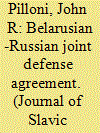

|
|
|
|
|
| Publication |
2009.
|
| Summary/Abstract |
Belarus and Russia have been discussing and actually working on the integration of their defense structures since Former President of Russia Boris Yeltsin and President of Belarus Aleksandr Lukashenko agreed to the formation of the greater Belarus-Russia Union State. Although development of the overall union state has been slow, some might argue stultified, the two countries have made progress in integrating their defenses. There are only a few colleagues with much interest in Belarusian defense matters, except within the context of their military relationship with Russia. What interest there is concentrates on several recurring questions. How much progress has there actually been? In what areas has the progress occurred? Does the integration present any sort of danger to the West? What sort of capabilities does this force have? This paper attempts to answer them.
|
|
|
|
|
|
|
|
|
|
|
|
|
|
|
|
| 2 |
ID:
092912
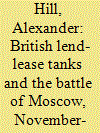

|
|
|
|
|
| Publication |
2009.
|
| Summary/Abstract |
This short article returns to the issue of the value of British Lend-Lease tanks for the Soviet war effort during late 1941 from a research note in Volume 19, Number 2 of this journal.
|
|
|
|
|
|
|
|
|
|
|
|
|
|
|
|
| 3 |
ID:
092905
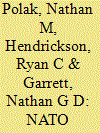

|
|
|
|
|
| Publication |
2009.
|
| Summary/Abstract |
While research on the North Atlantic Treaty Organization (NATO) and its out-of-area operations continues to thrive, very little analysis exists on NATO's ongoing membership enlargement. This article examines NATO's newest members, Albania and Croatia, and their recent efforts to transform themselves into security producers for the alliance. This research examines each state's recent military purchases, their potential geo-strategic value to the alliance, and their ability to contribute to NATO missions in Afghanistan and Kosovo. While their abilities to project force remain limited, the findings presented here suggest that these states have made measurable military advancements and bring meaningful geo-strategic advantages to the alliance, which provides additional evidence of the success of NATO's enlargement policies.
|
|
|
|
|
|
|
|
|
|
|
|
|
|
|
|
| 4 |
ID:
092902
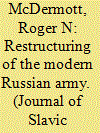

|
|
|
|
|
| Publication |
2009.
|
| Summary/Abstract |
The breathtaking level of unprecedented change within the Russian armed forces, first announced in the aftermath of the Russia-Georgia war in August 2008, not only proved rapid and quite unlike any of the failed reform attempts since 1992, but it caught many in the West and Russia unawares. While many concentrated on the proposed downsizing of the officer corps, which planned to axe 205,000 officers in order to maximize efficiency, a yet greater changed quietly and systematically implemented in the course of 2009 went almost unnoticed in the West; yet its policy implications will compel western governments to reassess their relations with Russia and their understanding of Russia's defense posture. In short, the mass mobilization principle, which had hitherto defined the Russian military, passed quietly into history, as the division-based structure within the table of organization was steadily and completely replaced by a new brigade-based structure.
|
|
|
|
|
|
|
|
|
|
|
|
|
|
|
|
| 5 |
ID:
092900
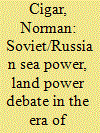

|
|
|
|
|
| Publication |
2009.
|
| Summary/Abstract |
The tumultuous change-or perestroika-after Mikhail Gorbachev came to power in 1985 opened the way for a wide-ranging debate on the most basic aspects of defense, and even of the country's very identity, including the age-old dilemma of whether the USSR/Russia is at heart a seapower or a landpower. The debate-which swirled around issues such as the country's geography, national interests, security threats, foreign policy, history, and the economy-highlighted the difficulty of balancing the country's orientation in these two basic realms. In its aftermath, the Navy underwent significant reductions in construction, training, and deployments. However, given the likely reassertion of Russian military activity in future years, these earlier arguments can provide a guidepost to a likely revived, albeit updated, debate by proponents of seapower or landpower.
|
|
|
|
|
|
|
|
|
|
|
|
|
|
|
|
| 6 |
ID:
092911


|
|
|
|
|
| Publication |
2009.
|
| Summary/Abstract |
This is a case study of the state as an agent of industrial development. Specifically, it examines the history of the Imperial Armaments Factory established by Peter the Great in 1712 in Tula until the Emancipation of Serfs in 1861, a period during which Imperial Russia was militarily self-sufficient and undefeated (except for the War of the Third Coalition, 1805-7). It was also a period when military technology was static. This study also seeks to demonstrate the importance and resilience of artisanry during this period despite central control and attempts to concentrate production in government-controlled factories.
|
|
|
|
|
|
|
|
|
|
|
|
|
|
|
|
| 7 |
ID:
092908


|
|
|
|
|
| Publication |
2009.
|
| Summary/Abstract |
Ukraine faces a long-standing absence of unity in political, economical, ethnic, cultural, religious, and mental terms. Especially EU- and NATO-related matters suffer from domestic disagreement and infighting over the future external orientation of the country.
In 2004, the Orange Revolution brought in a new Ukrainian leadership under President Viktor Yushchenko which put EU and NATO accession right at the top of its foreign policy priorities. But NATO has always been unpopular in Ukraine, especially in the Russian-speaking regions. Nevertheless, NATO standards are to be introduced in all fields of the management bodies of the Armed Forces. European integration has been a key priority of Ukraine's foreign policy already for a considerable period of time; it was not initiated by the Orange leadership after 2005.
|
|
|
|
|
|
|
|
|
|
|
|
|
|
|
|
|
|
|
|
|